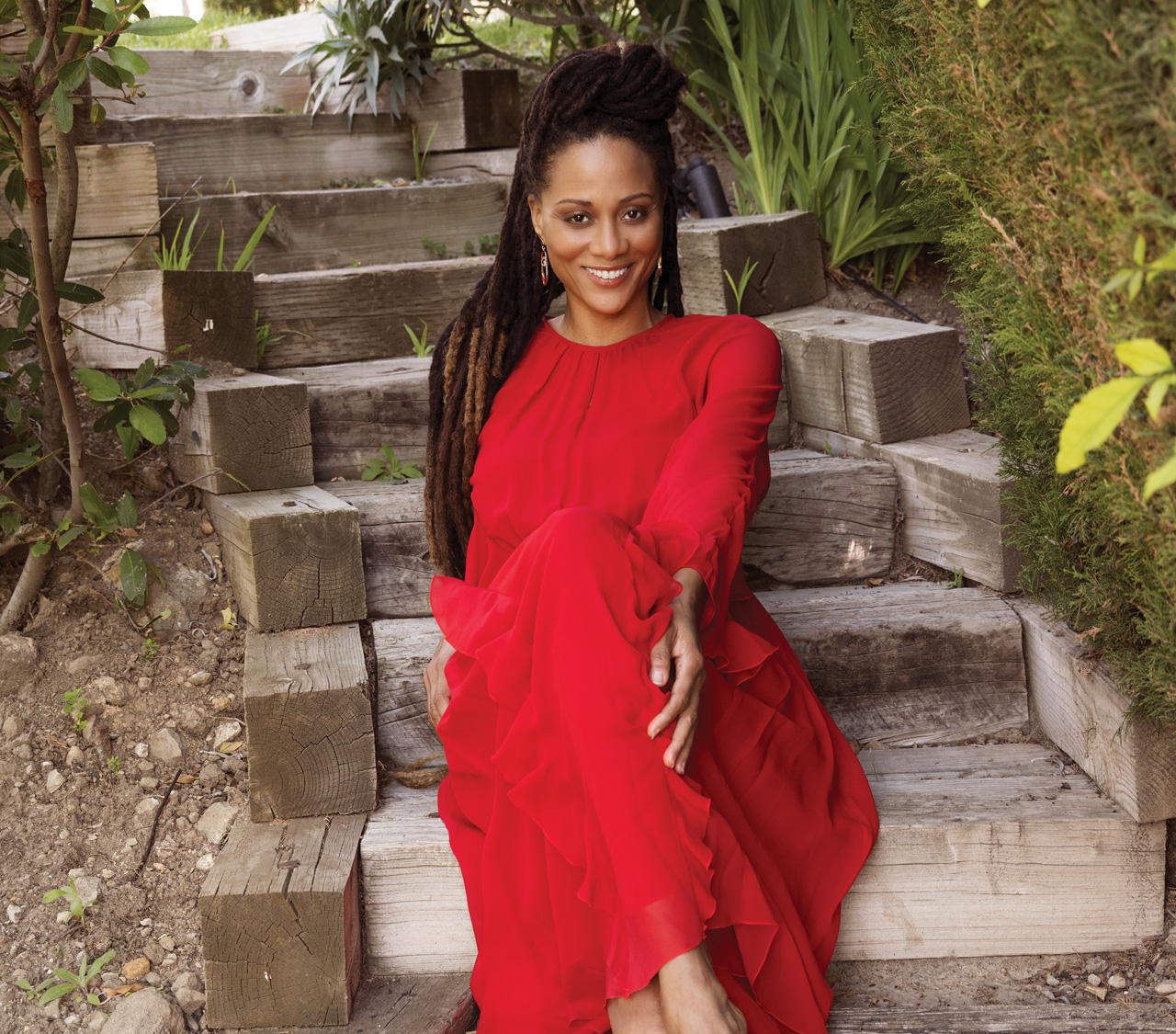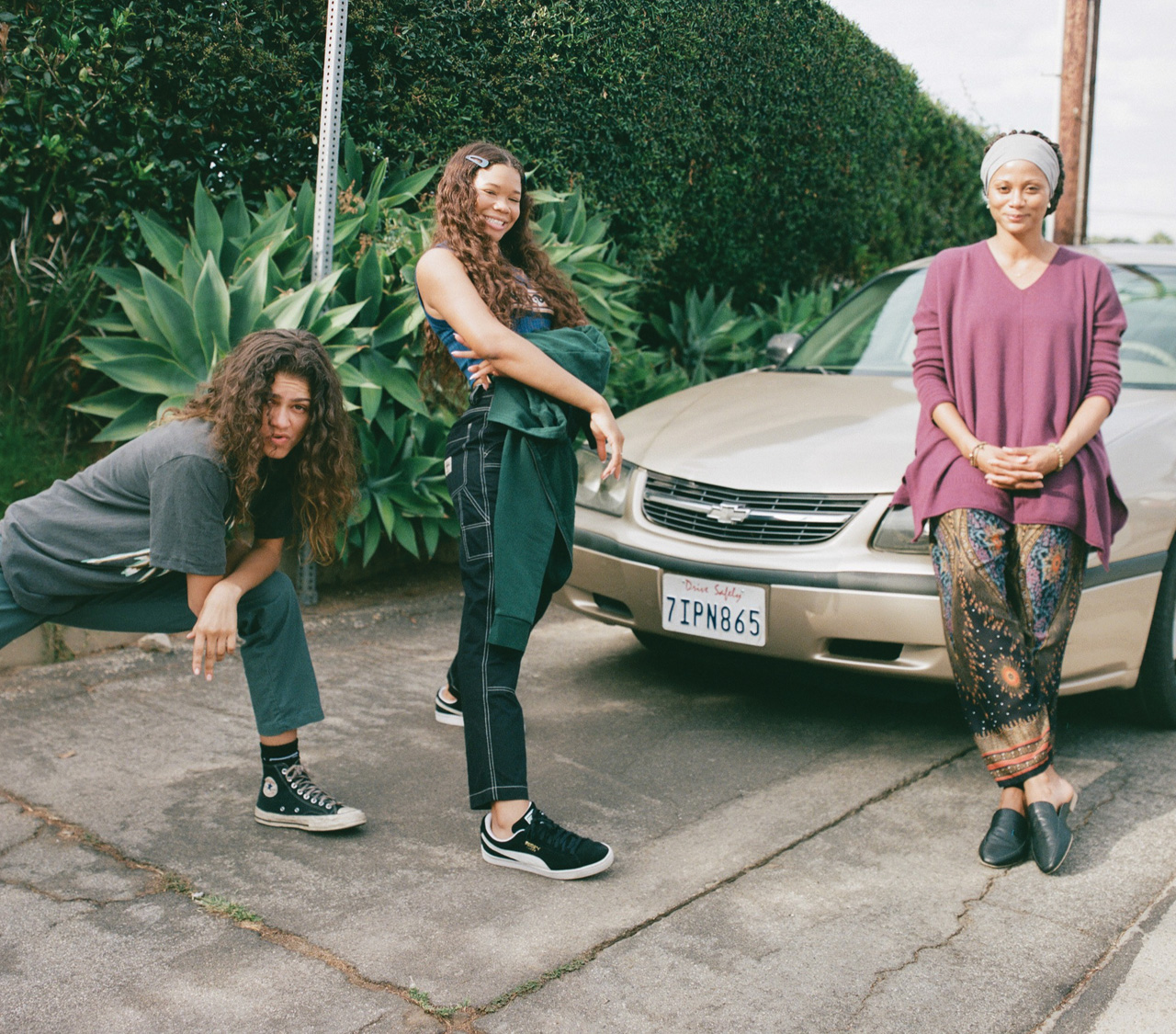
It’s enormously reassuring to discover leaders in society of the caliber of Nika King. Her role as Zendaya’s bravely-committed mama bear in HBO’s mega hit television series, Euphoria, is the perfect part for this powerhouse of a woman. Nika – the tenacious titan – stands solidly strong in her moral principles – both professionally – and personally. Her life experience is about challenges, hardship, pain, perseverance, success and societal responsibility. In case anybody is feeling defeated while reading this, press on and be inspired by Nika’s triumphant journey.
My first meeting with Nika was marinated by the sustenance of her razor-sharp wit. As I began reassuring her that our interview would not involve me prying into her private life, she quipped back cheekily,
“Oh no! That’s so disappointing. I was told that you wanted to know all my business. Interview over! I’m walking. Bye.”
Laughter forges an immediate bond between humans. It facilitates our shared desire to interrelate through the most joyful of all emotional releases.
As soon as Nika and I had broken the proverbial ice by breathing in lots of healthy oxygen, she dove into her story with invigorating energy:
“I’m really an open book. I do standup comedy, so I like to share my life story and I have no secrets.”
Nika describes how comedy was a natural avenue for her early on in life.
“When I was 5 or 6, I was this silly, sassy little kid who made people laugh by reading poetry and cracking jokes. I was voted the wittiest kid in high school and my teachers were proactive in entering me in oratory contests – so I was performing very early on in my life. I thrived on the instant love and gratification of a live audience – whether we were singing or doing a play.”
Despite Nika being so naturally gifted, the truth is that a finely tuned ability to make other people laugh is often a comedian’s coping mechanism for deep-seated pain. Nika’s childhood lends a light on that theory as she tells the story: “I was born in Liberty City, one of the worst projects in Miami. My life began in the humble environment of a slum. Mom was a single mother raising 6 kids on her own. She had lost her parents very early in her life, so she was adopted by a female pastor – together with her three brothers. Looking back, I realize that the challenges we faced as children made me determined to rise to the surface. I was driven and ambitious from a very early age. My parents were addicted to drugs, and I never met my dad until I was 9 years old, and so there were times when I wondered if the adversity would ever end.”
She remembers vividly: “There was constant upheaval in our home with fighting and violence. But the great thing for me is that I always had wonderful teachers at school. They were strong black women who were nurturing and caring, and they provided me with the tough love that I needed. I worked hard, obtained a scholarship to the University of Florida, and straight afterwards, I taught in a local high school for two years”.
Nika’s humor quickly disperses my idealistic notion that she followed her heart into teaching because of her great role models.
“Oh no,” she responds with the blunt truth. “Practicality transported me there. I had student loans to pay back and so I HAD to teach!” After a few giggles, she concedes that she did fall in love with teaching.
“It was so satisfying to be able to mold these young people’s lives. I was only 22 years old when I started so I was very close in age to my students, and we connected and bonded on many levels. I was their big sister and confidante, and I loved being that for them.”
Having attended the University of Florida’s Theater program, Nika’s ultimate dream was always to become an actor, so Los Angeles beckoned her like a magnet. She jetted off to Hollywood and worked tirelessly to earn her way on stage. She enrolled at Groundling’s Improvisational Theater School on Melrose Avenue, and when she landed her first gig, she was so elated that she called home to Miami and said, “Mama, I made it!”
Nika expands on her journey to Los Angeles:

I grew up in ‘Little Afghanistan’ in Miami, so my fervent hope is that I can be an inspiration for those in the same environment. If they can take strength from recognizing that I broke away from that cycle of poverty and made it – then I would know that I’ve done my job
“When you first arrive here, you know that you have what it takes, and your assumption is that people will see your talent and give you a break. Well, it didn’t happen like that. It was small gigs and small steps, but I recognize that those were important small steps in order to get to where I am now. I’m a firm believer in God, and that everything works out for the good. My faith has always kept me rooted and it’s given me the strength to go after my dreams. Now that I’ve reached my dreams, my life from hereon is about walking in my PURPOSE. I see so clearly how everything that has happened – from the moment I was born to now – had destiny written all over it.”
Nika’s majorly huge acting break was being awarded the pivotal role of Leslie – the mother of a drug-addicted daughter – Rue (Zendaya) in HBO’s Euphoria. After the second season ended earlier this year, fans are avidly waiting for season 3. Euphoria now ranks as the second most-watched show in HBO’s history, across all platforms, only behind Game of Thrones. Beyond a wildly talented cast, the show’s narrative is compelling, and the acting is powerful.
Nika describes how all the pieces in her life have built up to this moment in Euphoria:
“I grew up in a drug-addicted household, and all that experience has led to me be able to play the role of a mother who has a drug-addicted daughter. I slotted into it authentically with a deep understanding of how addiction impacts families.”
We discuss the ‘confrontation’ scene in Season 2 Episode 5 where Leslie (Nika) confronts Rue (Zendaya) in an explosive scene. Nika describes how she had to manage that climactic scene.
“In order to cope with the trauma of that scene, I had to step away from myself, and shut out my childhood memories at home. But on a positive note, it gave me a voice, and in my preparation, I often used my mom and a young baby Nika. The objective in Euphoria is always to save my daughter Rue (Zendaya), and that intensity of emotion always deeply affects me. I’m allowing myself to go there – to painful parts of my past – but in so doing, I also recognize that it’s a part of a healing journey.”
Nika’s recollections always end with a silver lining. She won’t allow herself to indulge in moments of self-pity. Traumatic memories – once recalled – are elevated to lessons learned and a sense of gratitude for the wisdom earned.
Nika expands:
“While acting and performing have always come naturally to me, I am now really exploring the opportunities I get in acting roles to completely lose myself. Interestingly, my mom always watches my performances, and most of the time, she’s never impressed. She’ll simply say, ‘Neneh, that was cute’. But when she watched Euphoria Season 2, Episode 5, she said, ‘Neneh: You were shaking, your lip was quivering. You completely lost yourself!’ Getting my mom’s approval has always been very important to me.”
We delve into a more in-depth discussion on why Nika is so suited for this life-changing role, and why this HBO series has resonated so powerfully with audiences around the world:
“Euphoria is a deeply personal journey for me,” Nika emphasizes. “Being raised in a black community in Miami where crack cocaine was imbedded, I saw the lives it shattered and how it affected the entire community for generations. Fast forward to 2022 and we now have an opioid crisis which is affecting white suburban America. Fifteen years ago, the pharmaceutical companies adamantly defended their drugs and said they weren’t addictive. We now know that this was not the case. The topic of drugs has been swept under the carpet for far too long. The problem is that big pharma and big business are involved and profit often supersedes doing what is right. How people become addicted to drugs is a complex topic. An addictive painkiller is the initial answer to physical pain but when teenagers can’t cope with mental anguish, they think that popping a pill is the answer. If a person is in a bad space in their life, turning to drugs will eventually cost them their lives. Euphoria has brought all those difficult and painful conversations to the table, and my hope is that it’s motivating people to address the problem head-on. If this show is helping people to become sober and clean, then that is a great outcome.”
We discuss the other bedrocks wherein drug addiction flourishes. Poverty is one of the leading causes of drug addiction and Nika explains:
“If a person does not have a sustainable job, decent housing, and healthy food to nourish and sustain them, their well-being is going to be severely compromised. When a person feels defeated, turning to drugs and alcohol is an immediate short-term fix for the mental pain. Mind-altering substances are an escape route from reality. When you consider that most people of color in the USA are living below the poverty line, it’s no wonder that drug addiction is so endemic in those communities. When crack cocaine was rife in the 1980s and 90s, the majority of incarcerations were black people, and many of them are still in jail. Their families are disfigured for decades. The children of the mostly black male population who are locked up for drugs – grow up fatherless – and they in turn go out onto the streets and they start selling drugs in order to survive. It’s a vicious cycle.”
Nika continues: “The opioid crisis has spread into white communities, too, and the lives of the families affected are turned upside down. Taking care of our mental health is so critically important, and that means that we must give people access to mental health assistance. We also need to foster an equitable society that does not treat drug addiction differently across color lines. For so long, we have criminalized addiction in the black community. It’s not happenstance. It’s been deliberately done. These people need help – not a jail sentence. We have to keep this dialogue going, and the tough conversations need to be had because only with dialogue and understanding, can we right the wrong and change how we do things. There is some progress, and that is encouraging, but we have to keep fighting the good fight, and keep digging deeply down to find out why the racial divides in our society still exist.”

Euphoria is a deeply personal journey for me. Being raised in a black community in Miami where crack cocaine was imbedded, I saw the lives it shattered and how it affected the entire community for generations
“I have found a cognitive dissonance amongst some people,” Nika continues. “They don’t want to believe that something as awful as the Jim Crow racial caste system occurred and that mass incarceration really exists and that it affects the black and brown communities. That reticence is evident in the books that are banned. ‘Eradication of Critical Race Theory’ is banned because white people don’t want their kids to feel uncomfortable about a sensitive topic. Until we all come to the table and recognize that the systems that uphold racism are still in place – then we will not make any progress. There has to be a complete day of reckoning in order for significant change to occur. What has really upset me about the Black Lives Matter movement is that no human-being should ever have to ask another human-being to treat them with the same dignity and respect. It’s never easy to look at oneself in the mirror – but we have to if we want a post racial America where there is genuine equality and fair opportunity. Until we reduce the racial divides that keep people in inferior sectors where housing, health and education are severely compromised, the entire U.S. economy will suffer from the inequality. We have to uproot the infected trees, dismantle them, and reconstruct healthy trees that grow in good soil.”
Nika’s success in Hollywood has afforded her the opportunity to close her poverty door, but she hasn’t walked away from the people who are still mired in its hopelessness.
“I know that I’ve climbed the Hollywood ladder, but I will never forget where I came from. I am now using my platform to take constructive action. I’ve created non-profit organizations that are making significant differences in communities. It is my responsibility to give back to society.”
‘Rose of Sharon’ is Nika’s Los Angeles-based organization that helps under-served communities with mental health wellness. In 2021, she started ‘Better Together’ – a Mental Health Storytelling Summit. She also has ‘Jeli Life’ – an online community Tech Platform that helps people of color who want to break into the entertainment industry. Nika’s resolve is about transforming society from every angle so that everyone has access to meaningful careers in the entertainment industry including writers, directors and VP status positions.
Nika’s optimism is passionately expressed as we discuss the Millennials and Gen Z’s.
“The next generation will be the ones who really start shifting and creating judicious change,” she confirms with strong conviction. “I am so confident about the up-and-coming generation. They are not their parents. Gen Z and the Millennials are the hope of tomorrow. When I look at my nieces and nephews and I see how they navigate this world, they are really striving to be better people. They use the internet effectively to look at all viewpoints, and they want to arrive at objective conclusions. They want to be fully informed – not ignorant.”
We discuss further the role of comedy in society, and Nika gives an earnest description of her craft:
“Being a comedian has given me the liberty to say a lot of things that may ‘cancel’ someone else who doesn’t have the swag to tell a joke. I love having the opportunity to be able to tackle tough issues but at the same time I’m making audiences laugh. Cancel culture is real, and I’m sure that a joke I tell may be offensive to some people, but at the end of the day, this is my art. I work in a comedy club. We don’t work in boxes, and people visit comedy clubs to laugh! I talk about everybody, and we have to learn to laugh. I try to get my audiences to relax and to know that my heart is in a good place.”
Nika elucidates with great sensitivity:

Zendaya, Storm & Nika – Euphoria. Photo by Eddy Chen/HBO
I love and respect Zendaya’s and Storm’s commitment to being better people. They understand their massive impact on the world, and they don’t take that responsibility lightly
“Art is a reflection of the times. If it’s the tragedy of the Ukrainian War that is taking place while I’m performing, in order to be authentic, my art needs to be a reflection of where the world is at. It’s about being present in the moment. It was Nina
Simone who said in a poem, ‘an artist’s duty is to reflect the times’, so I make it a point to stand in my truth and use my voice and platform for that purpose. With Euphoria, I’ve been given multiple opportunities to tell my story, but as an artist, the efficacy of my work will be measured in 100 years’ time when people look back in history and ask whether my performances were a reflection of the context of the times. God woke me up during the Covid pandemic and told me that play time was over. Consequently, I’m on a mission and I take it very seriously.”
Nika’s voice inflections take on an extraordinary power when she says with absolute assurance:
“I grew up in ‘Little Afghanistan’ in Miami, so my fervent hope is that I can be an inspiration for those in the same environment. If they can take strength from recognizing that I broke away from that cycle of poverty and made it – then I would know that I’ve done my job.”
That same encouraging flavor continues in Nika’s voice:
“A seed was planted in my spirit from early in my life. My teachers saw that seed and it germinated because they encouraged me to express myself in the arts. That light was always there. I was determined to get out of a negative situation, and I constantly got confirmations along the way that I was on the right trajectory. As I walked through the darkness, I constantly saw these little flickers of light that kept me going, and that was all I needed. I trusted God and stayed the course.”
We discuss the topic of marriage and children, and Nika is candidly open about her reservations:
“Years ago, I did not want to marry and have kids because I saw how men treated my mom, and I never had an example of a happy marriage in those impressionable childhood years. Also, I was on a mission to succeed in my career, and I wanted to keep the momentum going. But now I see my friends happily married with kids, so I do desire to have a family and to be with someone who loves me. It has to be the right person, though, and I won’t settle. I’m really open to adoption. So many parentless kids need love and a family. How great would that be to bring a child into a loving home?”
Nika goes about her daily life deeply sensitive to the human condition. In a large, bustling city like Los Angeles, there are so many souls that are invisible in their daily struggles. Nika knows that feeling only too well and so when she purchases a take-out lunch from a stranger, she makes a point of looking into the eyes of that stranger and saying, ‘How is your day going?’
“It’s about letting them know that they are not invisible,” Nika emphasizes, “and that I see them and I care. I go as far as to tell them that I love them, and I mean it. They are my fellow brothers and sisters. It’s amazing how it breaks down the barriers between people.”
For a long time, Nika’s naturally slender physique disguised her pre-diabetic condition. The only clue she had to this serious disease was the chronic pain she was experiencing, and she confronted her choices. With her characteristic strength and resolve firmly intact, she set about educating herself on foods that would nourish her body and put her in the green zone. She became a committed vegan, fully immersing herself in nature’s goodness and wholeness. She’s even built a home garden into her loft.

The efficacy of my work will be measured in 100 years’ time when people look back in history and ask whether my performances were a reflection of the context of the times
“Ever since I became a vegan, the chronic pain has disappeared,” she enthuses, “and the benefits of being physically healthy are inestimable. It transcends into being mentally and spiritually healthy.”
Nika just directed her first short film, “For Sale’.
“We shot ‘For Sale’ during the pandemic while many of us were dealing with the weight of not knowing what was happening to the world. The movie was about dealing with loss in a way that is visceral. A young couple is dealing with the loss of their daughter, and they go through the five stages of grief within the 18-minute film. What we really learned is that when grieving, you can’t skip stages. You have to process each stage and for each person, the journey is different. There are healthy conversations and self-practices. It’s about figuring out how to navigate grief in the best way for the individual. While supportive solace is beneficial, ultimately the grieving person has to want to help him/herself. I’m hoping that when people watch the movie, they see themselves in this unit of determination to overcome the obstacles.”
Before shooting Season 3 of Euphoria, Nika is on a mission to get ‘Blue Tree Café’, the restaurant she and her mother own in Fort Lauderdale, off the ground. She explains, “It’s a virtual kitchen and our objective is to bring it to marginalized communities so that they have more access to healthy food. The options are vegan and vegetarian, and my mother, who has beaten cancer three times, and who is determined to keep it at bay, is learning how to lead a much healthier lifestyle.”
I ask Nika who she most wants to hang out with when she’s not filming.
“My mother,” she says unhesitatingly. “I’m living my dream and I want to make mom’s dream come true. I’m eternally grateful for her hard work and sobriety. She’s always been a woman of faith and strength, and I credit my entrepreneurial side to her: as a single mom, she was constantly generating new ideas, and she had to be industrious and highly creative in order to support my siblings and I.”
When it comes to relaxation, Nika savors being able to sip a cup of tea – preferably while reading an excellent book. She also loves hiking in nature. Her favorite food is Thai, and her favorite movie is ‘Lady Sings the Blues’ (with Diana Ross portraying legendary jazz singer Billy Holiday).
“I have a spirit of positivity,” Nika reaffirms. I believe it is possible for us to live in harmony with each other; to be kinder to each other. Each one of us can make such a difference.”
I ask Nika what she continues to enjoy about working with Zendaya and Storm, her two hugely talented onset daughters in Euphoria, and she replies with a broad smile:
“I love and respect their commitment to being better people. They understand their massive impact on the world, and they don’t take that responsibility lightly.”
Neither does Nika. She’s a Hollywood success story so strongly rooted in her humanity that she’s warded off the pitfalls of fame. Long may her purposeful light shine.






